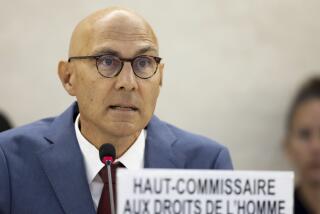Citing Iraqi Executions, U.N. Official Urges Focus on Rights
- Share via
GENEVA — The Iraqi government summarily executed more than 1,500 people for political offenses last year as the human rights situation in that country deteriorated to a new low, according to a United Nations special investigator who Tuesday urged the U.N. Security Council to devote as much attention to that issue as it does to dismantling Baghdad’s illegal weapons programs.
Since his appointment to the U.N. post in 1991, Max van der Stoel has periodically documented the excesses of what he called Iraqi President “Saddam Hussein’s regime of terror.”
But Van der Stoel’s latest findings come amid increased international debate over whether to consider lifting economic sanctions against Baghdad. The United States and Britain are likely to cite his report in opposing efforts by Russia, France, China and others to ease the restrictions. A regular review of the sanctions by the Security Council is expected soon.
Van der Stoel, a former foreign minister in the Netherlands, told a news conference here Tuesday that, despite Baghdad’s claim that the sanctions are the underlying cause of human rights problems in Iraq, there is no evidence that their elimination would improve conditions. “Any Iraqi who is even the slightest bit critical of the government is in danger, even of their life,” he said. “I don’t think if the sanctions would end tomorrow that the regime would change its ways. It only feels secure by maintaining its present policy of oppression.”
Van der Stoel acknowledged some frustration that the human rights situation in Iraq has failed to draw the kind of international attention devoted in recent months to U.N. inspections of Iraq’s weapons programs. “It has not come to the top of the international agenda,” he said. He suggested that the Security Council, which has jurisdiction over the sanctions, should apply more scrutiny to Iraq’s human rights record.
Van der Stoel presented his report to the annual meeting here of the 53-nation U.N. Human Rights Commission. Because Iraq refuses to let him into the country, he relies on reports from human rights watchdogs and other observers in bordering countries and on interviews with refugees and exiles.
In its reply to the commission, the Iraqi government rejected the report, blamed its internal problems on the U.N. embargo and accused Van der Stoel of being a tool of Washington.
Van der Stoel cited as the most egregious new violation the estimated 1,500 executions last year, most in a November and December “prison cleansing campaign” that began after one of Hussein’s sons, Qusai, the head of Iraq’s special security organization, visited one of the prisons.
Prisoners were shot, hanged or electrocuted on charges ranging from the attempted assassination of Hussein to belonging to an outlawed political group, he said. Four Jordanians, however, were executed for smuggling $850 worth of auto parts in a case that severely strained relations between Jordan and Iraq.
Family members who collected the bodies were charged the price of the bullet in those cases where the inmate had been shot. The condition of some bodies suggested that they were tortured before being killed.
Van der Stoel reported that ethnic and religious minorities, especially Kurds and Turkmen, continue to be targeted in forcible relocation campaigns intended to create ethnic Arab majorities in all regions of the country. Van der Stoel told reporters that an estimated 500,000 people had been arbitrarily displaced in the last 10 years.
He also denounced Iraq’s nearly 20,000 officially recorded cases of forced disappearances, the most of any country in the world.
More to Read
Sign up for Essential California
The most important California stories and recommendations in your inbox every morning.
You may occasionally receive promotional content from the Los Angeles Times.













